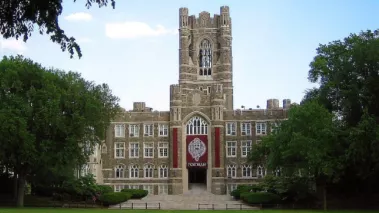Table of Contents
Fordham University Named One of America’s 10 Worst Colleges for Free Speech After Banning Students for Justice in Palestine

Victor Koval / Shutterstock.com
- SJP was banned solely based on the group’s political viewpoint
- TODAY: Disciplinary hearing for a student who peacefully protested the school’s decision
PHILADELPHIA, Feb. 22, 2017—Fordham University’s relentless and ongoing effort to stifle the free speech and association rights of students who want to start a chapter of Students for Justice in Palestine (SJP) has earned the school a spot on the 2017 list of America’s 10 worst schools for free speech.
The list—published today with detailed descriptions at The Huffington Post—was released by the Foundation for Individual Rights in Education (FIRE) to identify schools that are the “worst of the worst” when it comes to protecting student and faculty expressive rights.
Fordham earned this dishonor after Dean of Students Keith Eldredge rejected SJP’s request for official student group recognition based solely on the group’s political viewpoint last month. “I cannot support an organization whose sole purpose is advocating political goals of a specific group,” wrote Eldredge to the students. On January 25, FIRE and the National Coalition Against Censorship sent a letter to Fordham demanding that the university recognize SJP and noting that its reasons for rejecting SJP fail to align with the university’s stated commitments to free expression.
Last week, Fordham took the extraordinary step of initiating disciplinary action against a student who organized a rally to protest the school’s decision to ban SJP. Today, senior Sapphira Lurie is scheduled to attend a mandatory, closed-door disciplinary hearing. Astonishingly, Eldredge not only filed the complaint against Laurie; he will also investigate the complaint and he alone will rule on the outcome of the hearing. Additionally, Eldredge denied Lurie’s request to bring counsel to her hearing.
“Dean Eldredge is treating his students like the Queen of Hearts treated Alice,” said Ari Cohn, director of FIRE’s Individual Rights Defense Program. “But we haven't fallen through a rabbit hole and this isn't a Lewis Carroll novel. Dean Eldredge can't unilaterally ignore due process rights to silence students with whom he disagrees.”
Nationwide, more than 92 percent of American colleges maintain speech codes that either clearly restrict—or could too easily be used to restrict—free speech. The 2017 list of the 10 worst colleges for free speech includes both public and private institutions. Public colleges and universities are bound by the First Amendment. Private colleges on this list, such as Fordham, are not required by the Constitution to respect student and faculty speech rights, but explicitly promise to do so. In addition to Fordham, this year’s list includes:
- Northern Michigan University
- California State University, Los Angeles
- University of Oregon
- California State University, Long Beach
- Harvard University
- University of South Carolina
- Williams College
- Georgetown University
- DePaul University
Among the other institutions on FIRE’s list are a prestigious institution whose law school told a group of Bernie Sanders supporters they could not engage in partisan political speech on campus; a public university that threatened students with disciplinary action for discussing their own mental health; and one school that closed the curtain on a scheduled play about diversity because the administration feared it would be too controversial.
“Colleges continue to find excuses for censoring speech on campus,” said FIRE President and CEO Greg Lukianoff. “This list shows that any expression—even expression as innocuous as a chalk message for a political candidate or a discussion of one’s own health—is seen by some colleges as fair game for suppression. This type of censorship is not only unhealthy for institutions where debate and discussion should be paramount, but also dangerous for a free society.”
The Foundation for Individual Rights in Education (FIRE) is a nonpartisan, nonprofit organization dedicated to defending liberty, freedom of speech, due process, academic freedom, legal equality, and freedom of conscience on America’s college campuses.
CONTACT:
Daniel Burnett, Communications Manager, FIRE: 215-717-3473; media@thefire.org
Recent Articles
Get the latest free speech news and analysis from FIRE.

VICTORY: Court vindicates professor investigated for parodying university’s ‘land acknowledgment’ on syllabus

Can the government ban controversial public holiday displays?

DOJ plan to target ‘domestic terrorists’ risks chilling speech
